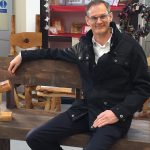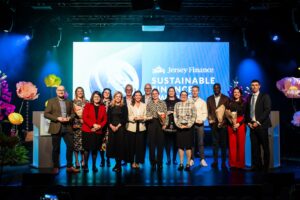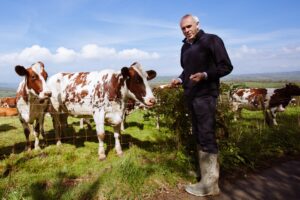
The general manager of Acorn Enterprises, Steve Pearce, is celebrating 30 years in the job. He talked to Caroline Spencer
It was in February 1991 that Steve was the first employee of Acorn Enterprises, with just an open field and a tractor shed in Trinity.
At that time, the first sheltered work schemes were at Oakfield Industries, on the Highlands College campus. It ran print workshops, bike repairing and French polishing, and these were only for people with physical disabilities.
After Jersey Mencap campaigned for something similar for people with learning disabilities, Rural Enterprises was set up on land at Howard Davis Farm. It developed, and thanks to some government funding, Acorn was created on land under the auspices of the Howard Davis Trust in Trinity.
‘At the time I had a job lined up to grow gladioli in Zambia,’ Steve said. ‘I had not long finished horticultural college and I was looking to eventually set up something myself so I had quite a good idea of what I wanted to do.
‘I think my name was put forward as something of a wild card. With a job to go away to, I had nothing to lose, and I wasn’t nervous at the interview at all, despite facing ten people round the table, including four politicians. I think I had Leslie Norman to thank for taking a chance on me.
‘I had limited experience of working with people with a disability, but my attitude was that it’s no different. Why would you treat anyone differently to anyone else? Everybody needs opportunity and a chance at the start.’
Starting with his office in his parents’ kitchen, his first job was to set up a small office, canteen and toilets, and then a multispan polytunnel. Soon, greenhouses were built thanks to backing from the Billy Butlin Charity Trust and these are still home to Acorn’s plant nursery today.
In the early days, Acorn ran a contract gardening service, with six crews, operating several large contracts including housing estates and all the landscaping at the Airport. They also grew more than 100 tonnes of tomatoes for export to UK supermarkets.
‘The whole ethos then was sheltered employment for people with a learning disability,’ Steve said. ‘There was no real drive to move people into open employment. Three people a year was deemed to be a success.
‘We were starting to show people what you could do given the right training, support and development, and given the right chance.’
When Acorn merged with Oakfield Industries in 2002, the Jersey Employment Trust was formed.
A significant change came with the appointment of Jocelyn Butterworth as executive officer. ‘Jocelyn developed the employment service, and there was now a strategy to move people through the system on to open employment,’ Steve said. ‘Within a short period, we went from three or four people going to open employment each year, to 150 people. By now, we offered opportunities for anyone who had any disability or long-term health condition.’
The horticultural side went through a difficult period, oil prices went up, tomatoes were no longer viable. Contract gardening was cut because it was too labour intensive in terms of support.
The nursery continues to thrive, however, with plant sales to the public as well as supplying bedding plants for the Island’s most prestigious parks, including Coronation Park and Howard Davis Park.
The Woodshack was added to the Acorn family in the last decade, which introduced an environmental strand to their work. ‘As part of some management training, John Hill and what was then TTS [the States’ Transport and Technical Services department] had to do a project they thought would benefit the States, the environment and the wider community,’ Steve explained. ‘They came up with the idea of reusing all the waste timber that was burned at La Collette.
‘John came to me to talk about it with the idea that it would be great if it benefited people with a disability at the same time. We agreed. John won an award for the project and we seconded him to set it up. He is still the manager of the Woodshack today.’
Acorn’s latest addition, Reuse, opened on the Trinity site in 2018.
‘We established Reuse as a social enterprise so the charity can stand on its own two feet,’ Steve said. ‘It just shows what can be achieved when the States, private sector and charity work together to make a huge difference for the better good of the community.’
Acorn Reuse provides about 50 jobs for people who have a disability or long-term health condition, it benefits other charities and low-income families, and is saving hundreds of tonnes of items being sent to landfill or the incinerator. In its first full year, staff sifted through 9,000 bin bags of clothing and more than 68,000 books.
Steve, who never did make it back to Zambia, added: ‘Disability legislation has come a long way in 30 years, and social media has played a positive part in highlighting people’s abilities.
‘JET and Acorn have a dynamic management team constantly working for the benefit of the organisation, often above and beyond what they’re paid to do.
‘In 30 years I have worked with some fantastic people, who have made it what it is today. And Les Norman and former Senator Paul Routier were instrumental in the early days.
‘Every day is different. It’s a job that gives you the feelgood factor. It’s challenging and constantly evolving but I love it.
‘In the car park last year, I saw someone struggling to put something in his car so I went over to help. He thanked me and as he did so he put his hand on my arm and said something along the lines of “What an amazing organisation you are. My grandson works here and if it wasn’t for Acorn, I don’t know what our family would do.”
‘Comments like that make it all worthwhile and make the year fly by.’




